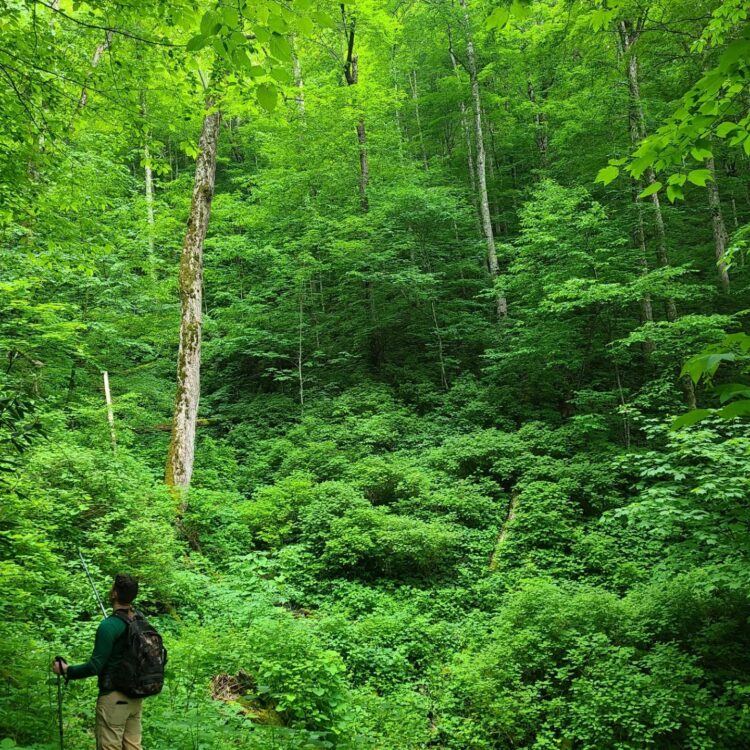If you’ve read other posts from my Nature and Health mini-series, you know that the number of ways that nature improves our health is staggering. Spending time in natural spaces benefits us in so many ways it can be hard to keep track of them all. In this post, I’d like to expand upon one especially valuable benefit of going outside: stress relief. People always tell me how much more relaxed they feel after a weekend or even a stroll outside. Breathing in fresh air, listening to birdsong, or enjoying peace and quiet, people feel less overwhelmed by the world after some outdoor time. But why does that happen? How does being outdoors relieve stress? Let’s have a closer look.
What is stress, and why is it bad?

Stress is our mental, emotional, and physiological response to external events or situations that feel negative or out of our control. This can come from feelings of pressure, being threatened, or feeling overwhelmed by circumstances. Does this sound familiar? If so, it’s no surprise. According to Gallup surveys, people all over the world are more stressed nowadays than ever before.
Although stress begins as a mental state (feeling “stressed out”), it also manifests in our bodies. Typically, this means changes in things like our heart rate and hormone levels, which can subside after a time. However, when we stay stressed over a long time, that stress can become chronic.
Chronic stress can lead to bigger problems like high blood pressure (hypertension), fatigue, chest pain, muscle tension, headaches, and digestive issues. On a longer time scale, chronic stress can trigger cardiovascular disease, stroke, asthma, and other critical health issues. It can also suppress the health functioning of our immune systems.
This means that our bodies are less able to protect themselves from disease. Additionally, there is emerging evidence that chronic stress increases the likelihood for a variety of autoimmune diseases and other ailments.
High stress levels are also a major risk factor for mental illnesses, especially depression and anxiety. Consequently, stress is a growing problem for peoples’ mental and physical (bodily) health.
How does being outdoors relieve stress? Theory and Effects

The prevailing scientific theory around the stress benefits of being in nature is the Stress Reduction Theory (SRT). The thinking behind this theory is that our nervous systems are wired for dealing with natural environments. In nature, we encounter situations and objects (what psychologists call stimuli) that our brains evolved to handle.
By contrast, urban environments and modern-day situations often bombard us with fast-paced, urgent demands on our attention. They involve things that are out of control and sometimes scary and overwhelming. Based on SRT, a temporary return to more natural environments can work wonders for those stress levels.
Recovering from stress

One of the best-established benefits of time in nature for stress is boosting recovery from stressful events or situations. In other words, if you’re already feeling stressed, being outdoors can help you reduce its impacts. Importantly, more rapid recovery from stress can help you avoid chronic stress, which leads to loads of health problems.
Interestingly, recent research shows that the more stressed you are, the more dramatic the recovery benefit from being in nature. Stress recovery is also important for keeping your brain at peak performance. Being stressed impairs your cognitive acuity or mental sharpness. However, the stress relief and recovery benefits of outdoor time help people recover that clarity of mind.
Acute stress and trauma
Extremely stressful events and resulting emotional trauma can lead to a condition called Post Traumatic Stress Disorder (PTSD). This is not uncommon for people who have found themselves in violent or extremely dangerous situations. For example, soldiers, emergency medical personnel, or victims of violent crime frequently suffer from PTSD. Fascinatingly, time outside can even help people recover from PTSD. Time spent in a group in a natural setting, especially if it involves conversation, can enhance this effect.
How does being outdoors relieve stress? Pathways

Knowing about these fantastic stress-relief benefits, you may be curious how time in nature makes all this happen. Research on the mechanisms for how being outdoors relieves stress is further behind than research on its benefits. However, there are at least four ways that scientists believe it happens. Time in nature relieves stress because it:
- Makes people feel more happy and positive
- Lowers stress hormone levels in the body
- Brings down the body’s “fight-or-flight” response
- Exposes people to airborne stress-relieving chemicals
Mental and emotional stress relief

Feeling less overwhelmed and frightened takes away the mental trigger of stress. In other words, when we feel happier, more relaxed, and positive about the world, we stop feeding stress symptoms. Researchers studying forest therapy found that walking or sitting in the woods provided strong mental stress recovery effects.
In particular, people experienced more positive emotions and a relaxed state of mind. Problems that had been stressing them out seemed manageable instead of scary or looming. This applies both to people suffering from chronic and acute (short-term) stress.
Stress relief through changes in our bodies
Taking a walk outside, or even looking at a beautiful picture of a natural scene, can alter patterns in our bodies associated with stress. For example, scientists have documented reduced heart rate and blood pressure, and a drop in stress hormones and stress-associated chemicals in people that spend as little as 20-30 minutes outdoors.
Plant chemicals in the air

I have saved the weirdest for last in this post. Recent chemical research suggests that a diversity of airborne chemicals in natural areas have anti-stress properties. These phytoncides are naturally occurring and especially abundant around pines and other plants with a diversity of aromatic compounds.
Although research on phytoncides and their beneficial effects is just beginning, the implications are clear. By breathing cleaner, fresher air and being exposed to these chemicals, you may effectively be dosing yourself with stress-relief chemicals. No doubt as research continues, scientists will uncover new and exciting mechanisms for how being outdoors relieves stress.
Thanks for reading!
Have you had a nature experience that helped you handle stress? Are you interested in hearing more about Nature and Health topics? Let me know in the comments! If you have additional questions, or want to share your thoughts on the blog, please drop me a line using the Contact page.

